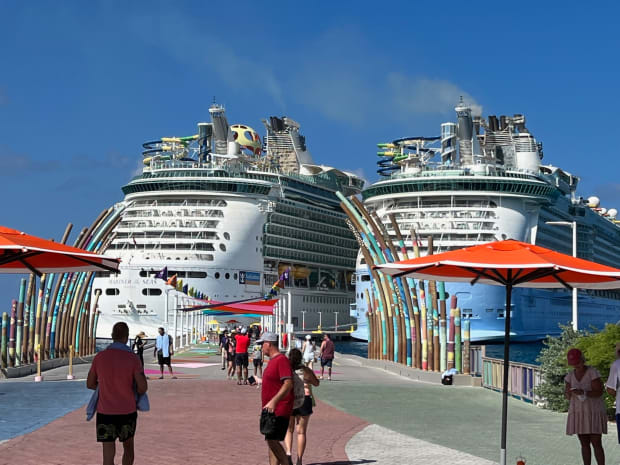Before the pandemic, cruise ships routinely sailed with 100% or greater capacity. That's because full capacity is based on double occupancy and some rooms can accommodate more than two passengers.
The ships operated by Royal Caribbean (RCL), Carnival Cruise Lines (CCL), and Norwegian Cruise Line (NCLH) can handle those crowds. Yes, at full capacity the pool decks and certain spots onboard can feel crowded, but the ships are designed to deliver a good passenger experience however many people are on board.
After the pandemic closed the cruise industry in North America, from March 2020 through July 2021, all three major cruise lines returned with very constrained capacities. Royal Caribbean's Freedom of the Seas, for example, sailed from Miami on July 2 with about 1,000 passengers, roughly 30% of its full capacity.
Numbers have increased since then, but it has been a slow process. That has led to people booked on cruises wondering exactly how crowded their ships will be. The answer has generally been "less than full," but that's changing, according to Royal Caribbean Chief Executive Jason Liberty, who spoke on the company's first-quarter-earnings call.

Daniel Kline/TheStreet
Royal Caribbean Has Built Back Capacity
Royal Caribbean, Carnival, and Norwegian have all taken slightly different approaches to bringing ships back into service and increasing capacities. Liberty explained where capacity has been and where it's going.
"Load factors improved throughout the first quarter, and we finished the month of March at a load factor of 68%," the CEO said. "We expect our load factors to continue to build, averaging between 75% and 80% in the second quarter, and reaching triple digits by the end of the year."
Capacities have varied based on not just customer demand but also on the varying impact of the pandemic. And while a full return to normal is the goal, Royal Caribbean has been careful about how it has increased passenger counts.
"We continue to be thoughtful about the build of our business, being mindful of maintaining price integrity, taking advantage of high onboard spenders, and, as always, focusing on the health and safety of our guests and crew," Liberty said.
Carnival reported that in its first quarter -- January through March -- the numbers were well off historical norms.
"Occupancy — the number of people occupying available cabins — is still relatively low. In the first quarter 2022, [Carnival] said its occupancy was 54%," Cruzely reported. "For comparison, the average occupancy in 2019 (the year before the health crisis) was at 106.8% across all its ships."
Given that those Carnival numbers were for the full quarter and January and February had some impact from the Covid omicron variant, March capacities likely were in line with the numbers reported by Royal Caribbean.
Cruise Demand Remains Strong
Cruise lines can set capacity, but they can't make customers want to take a cruise. Demand, however, is not a problem according to Liberty.
We continue to see strong demand for leisure travel and cruising. The robust secular trend of experiences over things that propelled our business in the past years is now recovering toward pre-COVID levels. Consumers are now reengaging with the world, and as a result, spending on travel in 2022 is set to outpace pre-pandemic levels with consumers planning to travel more frequently. Cruise consideration is the highest it has been in two years and nearing pre-pandemic levels with the most significant recovery among those new to cruising.
Royal Caribbean's CEO has not seen inflation or other economic concerns drag on cruise demand.
"Consumers are in a healthy financial position. Strong labor markets, wage growth, and record cash savings, $4 trillion in the U.S., support spending on vacation experiences," he said.
"We are watching the high inflationary environment, but so far we had not seen an impact on consumer behaviors or willingness to spend on travel in cruise vacations.
"Strong demand for cruise experiences continues to translate into robust onboard revenue performance for us across all categories from casino, beverage, and shore excursions to internet, retail, and spa."







